We’re starting off 2023 with some long overdue unfinished business from 2022, some more book reviews.
Ramona the Brave
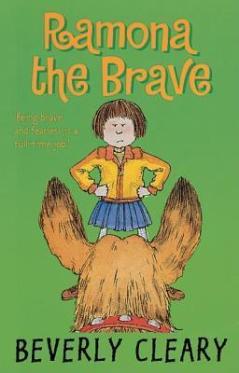
Well, we’ve seen what Ramona is like on the TV screen, so how about we delve into her stories in literary form? This isn’t the first Ramona book, but it’s still fairly early on, being the third one in the series (or second if you don’t count Beezus and Ramona). Before this came Ramona the Pest, but they didn’t have that one at the library at the time. In case you were wondering, this is the book where Ramona tries to use “guts” as a swear word. The other notable scene from this book that made it into the movie is when the workmen cut a hole in the house, and just like in the movie, people think she’s lying about that when she’s just being more dramatic about it than an adult might, which is always a feel-bad moment. Beyond that, she embarrasses Beezus by sticking up for her when some kids are teasing her, and her first-grade teacher is seemingly strict and unfeeling. The teacher also tells her that nobody likes a tattletale, which is stupid enough when a kid says it but is a really off-putting thing for an adult to say; it comes off to me, at least, as “don’t bother telling adults anything even when something is wrong or unfair”. The biggest thing that I remembered from reading this book previously (yeah, this wasn’t my first time, but it had been a while) is one of Ramona’s annoying classmates plagiarizing a craft project that she worked on and getting praise from the teacher for it, resulting in Ramona getting understandably ticked off and wrecking both of them (but then refusing to explain why she did it…gee, I wonder who trained her to do that?). At the end, Ramona gets chased by a dog, loses a shoe, and has to come up with a creative solution to such a problem, but she gets complimented for her courage, and all is well.
Rating: B-
Ramona and Her Mother
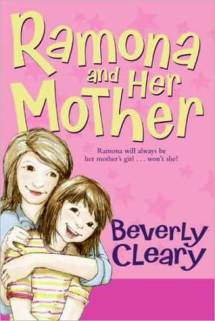
This is the fifth book in the series, and one that I hadn’t read as a kid. Ramona is partway through second grade in this one, and you can already see her being more mature, as she was more mature in Ramona the Brave compared to Beezus and Ramona (the book, not the movie with a similar name). See, this is one of the reasons why we like Beverly Cleary; she’s one of the rare authors who can not only write child characters realistically but do so with enough nuance to distinguish between a 4-year-old, a 5-year-old, and a 7-and-a-half-year-old. In this one, Ramona is faced with a friend’s annoying little sister (and offended by the suggestion that she was ever like that), an argument between her parents about a dinner mistake, a haircut that works out fine for Ramona but leaves Beezus upset, and Ramona deciding to wear pajamas to school and only realizing later that it wasn’t necessarily the best idea. The pajama incident results in an apparent betrayal of trust by her teacher, another argument, and Ramona feeling like nobody gives a guts about her and deciding to run away, which plays out much as it does in the movie. So yeah, this is the one where the heavy suitcase scene comes from. This is followed in turn by Ramona’s mother clearing up the conversation with the teacher and reaffirming her love for Ramona. Another fine entry in the series.
Rating: B-
The Time Garden
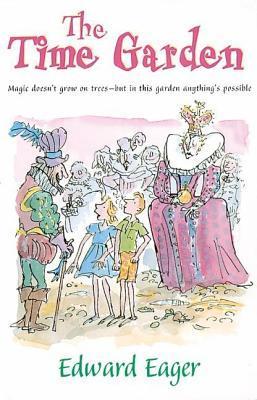
It’s another Edward Eager book. This is another one about time travel, if the title didn’t make that obvious enough. The child protagonists find a garden where they meet a magical toad-like creature called a Natterjack, who tells them (in a Cockney accent) that the thyme in the garden is magical and will let them travel through time and space depending on what type it is. (Yes, there are a lot of time/thyme puns.) They go back to various periods in history and often get into trouble. Something that I hadn’t realized before reading this is that the kids in this book are actually the offspring of one of the protagonists from Half Magic and Magic by the Lake, which was foreshadowed in the latter in a way that I didn’t notice. I think this is actually the second book that has this particular cast; I could probably find the first one, but I don’t know in what order the four books were written. It’s worth noting, too, that these children seem to be overall more practical-minded than their predecessors; at worst, Eliza can be impulsive sometimes (which gets her thrown in a dungeon when they visit a medieval queen). It was a decent enough book, but it’s another one that wasn’t noteworthy enough to stick with me that well, so I’m having a hard time coming up with things to say about it.
Rating: C+
The Enchanted Files #1: Cursed
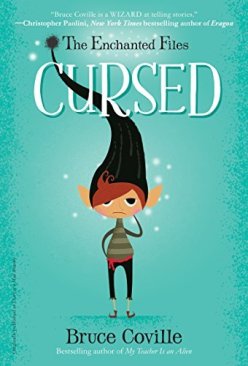
The first of a relatively new series by Bruce Coville, who has written quite a lot of speculative fiction of different genres, some of which I read quite a bit growing up. This book centers around a brownie whose family is cursed to serve a particular human family until either both of them die out or the person who cursed them reconsiders, and a human girl who is ridiculously messy and freaked out when some little man shows up in her house and cleans her room. Naturally, the story focuses on the two of them teaming up to break the curse before they both go nuts. It’s an okay adventure fantasy, but there is one thing it does that almost invariably sours me on any story, and that is featuring traditional-style fae. While the ones in this book are at least a lot more child-friendly than most portrayals of them, I’ve noticed a distinct pattern with fairies in pretty much any narrative-based media intended for people beyond third grade, and that is that they are complete wastes of oxygen. Those molecules could have been taken in by a different, more worthy creature, such as mosquitoes, which at least make good food for bats. The problematic fairy in question is the queen, who is responsible for the aforementioned curse. She did because her daughter left the fairy world and ran away with a guy that she didn’t approve of. Because that’s totally a reasonable reaction. She also, at one point, threatens to execute one of the protagonists for protesting. You know, for fairies like that supposedly possessing the wisdom and life experience of centuries, they sure don’t ever seem to gain social and emotional intelligence or maturity beyond that of a 3-year-old. No offense intended to my actual 3-year-old niece, who probably has better morality and emotional stability than a lot of fairies you see. Yes, I realize that portrayals of traditional fae are supposed to make them seem inhuman, but the only thing they ever do for me is provide a sound argument for why genocide might be justified in a few cases, even if those situations are fictional. One could certainly write a story from an anthropological standpoint where the fae are no more evil or more good than humans, are just as wary of humans as humans are of them, are more similar to humans (or any other intelligent species in the setting) than either race assumes, can coexist with humans (or other intelligent species) without either of them getting murderous, are able to recognize and acknowledge different cultural standards and that any sense of cultural superiority is misguided and/or only relative to one’s own experiences, or any combination of the above, but how many stories have you seen that actually do that? tl;dr: Traditional fae are garbage, and they deserve death. At least in this book, though, the fairy in question is only in one scene and isn’t as terrible as a lot of them, so she’s not too much of a blight on the experience. From what I’ve seen, this is one of those stories where the different books are set in the same universe but feature completely different stories and characters, so we’ll see how the rest of them turn out.
Rating: C+
9 From the Nine Worlds
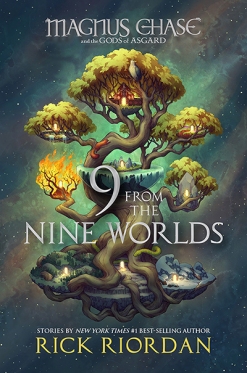
Since the next Magnus Chase book wasn’t available, I got a collection of short stories set in its world instead. When these stories take place compared to the main series, I’m not sure, but one of them focuses on a character who isn’t introduced until the second book, so I’m not very familiar with them yet. There’s a story for several of the different demigod characters and other creatures…and one of Samirah’s relatives who explicitly isn’t a demigod, which I’m fairly sure was just added to pad out the total story count to an even 9, because it sticks out like a sore thumb. The stories were fine in themselves, showing a few one-off adventures focused on one person each, and it was interesting to see some narrators other than Magnus. They did, however, typify one of the problems I have with short stories. They fortunately didn’t seem to suffer from the biggest problem I have with a lot of short stories, which is having unsatisfying endings due to abruptness or plot twists, but they certainly lived up to the “short” part; it felt like there was barely time to enjoy any of these little vignettes before it was time to end and switch to the next character. It’s a plus that they were all about characters who had all been introduced already, so there wasn’t that feeling of “this is all the time I get to spend with this character?!”, but it’s a minus that this is the only time in the series that we get to have other narrators (as far as I’m aware), and they all only get about a chapter’s worth of story to themselves (Samirah’s comes to mind as being particularly short). In summary, my problems with this book are not with the content, but rather with the format.
Rating: B-
The Hidden Oracle (The Trials of Apollo #1)
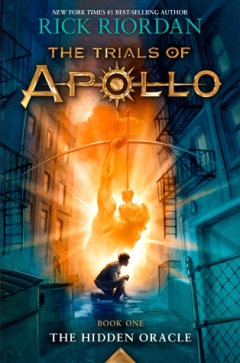
Here is yet another Rick Riordan series about Percy Jackson and his friends, except this time, it’s actually about Apollo. Apparently, he did something bad that Zeus didn’t like, so Zeus had to punish Apollo for it, which, if you’re not familiar with Greek mythology, is kind of like a yak getting mad at a human for being too hairy. In any case, as retribution for his Apolling behavior, Apollo loses his god powers and becomes an ordinary human boy until he can prove himself. Apollo is self-centered enough that I really can’t say it’s entirely undeserved, but sheesh, if every Greek god who acted like a jerk got turned into a human teenager, there’d be enough for an entire high school orchestra and Mount Olympus would be pretty darn empty. He meets a daughter of Demeter named Meg, not that either of them realize that at first, and the two of them try to combat the new threat: a trio of evil Roman emperors who are essentially back from the dead. The main villain of the book is Nero, the guy who supposedly burned Rome down while playing the fiddle and who lent his name to a CD-burning program first released in 1997. He’s also Meg’s abusive stepfather and has convinced her that his nice persona and his mean persona are two separate people and that she is at fault when the latter comes out, as abusers do. Frankly, Nero and his buddies are the lamest villains in one of these series yet; characters like Kronos (from the original Percy Jackson and the Olympians) and Gaea (from Heroes of Olympus) were ancient, powerful gods, while these jerks are just…guys. Even if they are some of the most famously psychotic Roman emperors, they’re still just human tyrants who think they deserve to be gods. I guess they, and Nero in particular, are the Mother Gothel or Gaston of the universe, being villains who are more likely to happen in reality compared to their compatriots, but they’re less entertaining because they don’t do anything cool like Maleficent or Ursula.
In any case, Apollo and Meg make it to Camp Half-Blood, go through several more ordeals, reveal a plot by the emperors to control the oracles and communication lines, and learn just who they’re dealing with. They eventually confront Nero himself, who escapes to prepare future villainous actions in the sequels. I can’t decide how this compares to any of the previous series in this universe; it does seem to raise the stakes and level of danger and drama compared to the first two series, which isn’t necessarily a good or bad thing, but I think I still liked the original better, and I would cite that as one reason why. I haven’t read a bad book by Rick Riordan yet, though, and this is decent enough.
Rating: B
The Fowl Twins #1
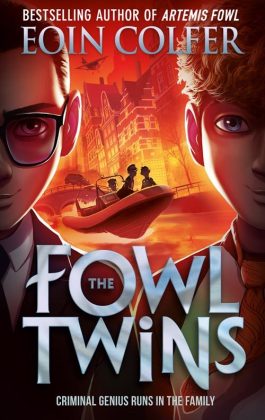
This is the first of a sequel series to the original Artemis Fowl, which I may review at some future date if I decide to do reviews of books that I previously read. Since this is the first thing in that universe that I’ve described on here, though, I’ll have to provide some backstory. Artemis Fowl is a teen genius (12 in the early books) from a rich and powerful family and wants to use his considerable resources both material and cerebral to gain even more money by extorting the fairy kingdom. He successfully kidnaps a fairy in the first book and ransoms her, and then the other seven books in the original series follow his future adventures with the fairies, various villains, and his own difficulties in being a good person. The Fowl Twins, on the other hand, focuses on Artemis’s little brothers, who were 3-4 years old in the original series and are now 11 and ready to get into their own wacky hijinks. Myles basically follows in his older brother’s footsteps, being an unabashed genius with no ability to relate to normal people and a habit of never using small words if a big one will do because his IQ is over 170. (You know…the trait that fiction writers always give their smart characters to show how smart they are, with no regard to how realistic it is. Heck, Marilyn vos Savant has an IQ of at least 186, possibly over 200, and she doesn’t talk like her sole resource for learning to speak was the unabridged Oxford English dictionary.) Beckett, meanwhile, is hinted to be smarter than average but hides it very well by being a complete space case. There’s also a new fairy named Lazuli who is a rare species hybrid, a miniature troll whom Beckett bonds with, and the villain, Lord Teddy Bleedham-Drye. Yes, that is actually what Eoin Colfer decided to call the guy. As character names go, that is barely a step above “Mike Rotch”, “Ivan Aufelich”, or “Kenny B. Meaner”.
As far as the tone goes, while the original Artemis Fowl started out relatively serious, this series pretty much goes for absurdity right off the bat, and it was a bit jarring at first. Once I’d picked my disbelief up off the floor that it had crashed onto, patched it up, and suspended it with stronger cables, I could continue with the story. The troll is basically the linchpin of the plot; Lord I. P. Knightley wants to use it as a game animal, while a secondary antagonist, a fiery nun from a secret society called ACRONYM (how meta), wants to kidnap and study it. The eponymous brothers want to rescue and befriend it (or at least Beckett does), and the fairy ends up getting caught up with them while trying to observe the situation, so naturally, the different groups butt heads and the twins have to figure out escape plans. Around chapter 12 or 13, the story seemed to hit its stride, once everything had been established and everyone had been portrayed. I will say that this book seems to have some rather odd pacing to it; it doesn’t really feel like a traditional 3-, 4-, or 5-act structure and more resembles a sine wave. The heroes get captured by the villains, they escape, they get captured again, they escape again, rinse and repeat for 354 pages. While the story does have a clear climax and resolution that one could point to, taking the nemesister out of the action entirely and leaving Lord Hugh Jass to make an improbable escape and cause trouble in the sequels, it doesn’t feel that much more climactic than most of the book. Eoin Colfer didn’t always seem to understand “show, don’t tell” either, given things like him telling us that the bad guy is, in fact, the bad guy and that we’re showing what happened after the cliff scene. Also, Lazuli was the only character whom I really liked all that well; Myles was so irritatingly smug that I didn’t even want to root for him, and Beckett somehow felt like a manchild despite being an actual child. It was decent enough entertainment while it lasted, I suppose; just don’t expect anything profound.
On a side note, at the time of this writing, the character page for this subseries on TVTropes is woefully incomplete. It’s not separate from the main Artemis Fowl one, it has almost nothing listed for the main characters, and several other very important characters are flat-out AWOL. Do any readers who are less lazy than me want to help fix that?
Rating: B-
Every Time I Find the Meaning of Life, They Change It
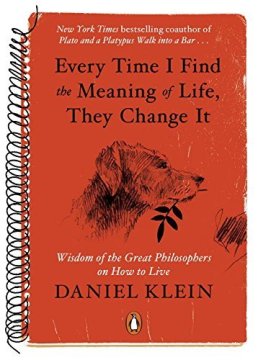
This was an impulse checkout. The witty title caught my attention, and I thought it might be worth a read. It can be summed up in pretty simple terms; each section begins with a quote from a philosopher or other famous wise person, and the rest explains why the author finds it useful, how it figures into his philosophy, and how the reader can take it to heart for their own life. It’s a bit dry, but there are some worthwhile quotes here if you’re the sort of person who finds those useful.
Rating: C
That Doesn’t Mean What You Think It Means
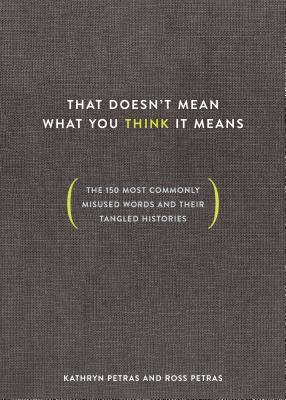
This is a book about words, specifically, a variety of words that often get misused. It discusses what the word is supposed to mean, as well as some other words with which it may get confused. I find it interesting to read about this kind of thing even though I don’t generally have trouble confusing similar words, but there actually were a few listed whose proper usage I hadn’t been aware of. I hadn’t really thought about the difference between “staunch” and “stanch”, for one (not that I’ve had much occasion to use either word); I knew that “regime” and “regimen” weren’t the same word but hadn’t really thought about there being some overlap in their meaning; I didn’t know that “ferment” could mean “stir up”; I had no idea that “perk” was short for “perquisite”; and I don’t think I knew that, in prescribed usage, “eponymous” actually refers to the person that a thing is named after rather than the thing (though Wiktionary lists both). I also doubt that many people are aware that “travesty” is supposed to mean more of a gross caricature or mockery of something rather than simply a disaster, but that’s a change that probably won’t be resisted much. Some other notable words that I either hadn’t heard of or didn’t know the dictionary definition of were conterminous, foment, fulsome, immanent (not the same as “imminent”), limn, meretricious, militate, prodigal, restive, tendentious, and venal. That said, ironically enough, the authors made a few mistakes in word choices themselves, such as confusing Kronos with Chronos (to be fair, even Rick Riordan screwed that one up) and using “preantepenultimate” to mean “fifth from last” when it clearly means “fourth from last” (look at the number of prefixes). There were a few typos as well, such as leaving one letter of a word unitalicized in the entries for deprecate and scarify and missing the second “i” in “horribilis”. Oddly enough, the copyright page was at the end of the book rather than the beginning as expected. I also wish that they’d touched on “amount” vs. “number”: they did include “less” vs. “fewer”, but surely more people confuse those than say “foment” when they mean “ferment”, right? (Another good one is “that” vs. “which”, but it’s been long enough that I don’t remember if that one was in there or not.) I thought it was an enjoyable enough read, anyway, and it could be a useful guide if you knead too fined a whirred and don’t no witch won two ewes.
Rating: B-
Have You Eaten Grandma?
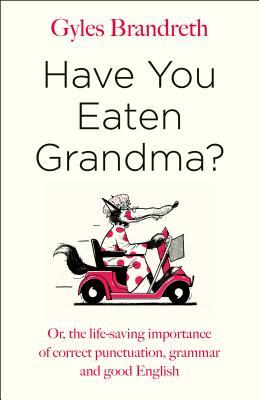
This is another grammar book (or grandma book?). It covers a variety of aspects of the English language and how to use it correctly, such as the punctuation missing from the title. It even mentions some of the differences between British and American usage, and does so without being condescending to American English, which is refreshing. The writing style is entertaining enough, but unfortunately, I barely remember any details about this one, which I at least partly attribute to checking it out at the same time as the previous one and reading them right in a row; the two books kind of blurred together. So, uh…Gyles Brandreth and Lynne Truss OTP?
Rating: B-
With that, that’s all for now. Stay tuned for more reviews and other things later in the year. (Here’s hoping it won’t take me so long to get the next batch out….)